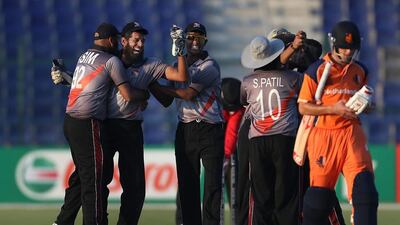A moment of revelation came during the UAE's third-place play-off against Nepal on Saturday.
As one of the UAE batsmen walked off the field after he was dismissed, a teammate stopped him in the dug-out. He asked for the dismissed batsman’s helmet so that he could use it when he went out to bat.
There could be different explanations for this. Maybe a helmet had simply gone missing and this was the easiest option. Maybe the batsman wanted to try a different helmet.
But the strongest instinct was to imagine that there might not be enough team helmets in the squad.
If that is the case, then nothing could capture better the nature of the UAE squad. More than so many other sides in this tournament, they are amateur, part-time cricketers in the truest sense of the description.
Not every associate is a professional or signed to a central contract, but most of the better sides seen in the World Twenty20 Qualifier have now found ways to have their players involved full-time in cricket.
The UAE’s players, as is well-known, all have day jobs. Cricket is a priority only spiritually; professional priorities they owe to their employers.
Only once they are done with their day can they give time to any kind of preparation. Their coach Aaqib Javed has repeatedly expressed his amazement at the dedication of those who finish a full day’s work at 5pm and then train for a couple of hours. Some play in tournaments such as these on unpaid leave.
Indeed, many of these are guys you could conceivably catch playing on cement wickets in the middle of the dusty, sandy fields on a Friday that surround the Sheikh Zayed Stadium in Abu Dhabi.
In light of all this, what they have just achieved by finishing fourth in the World Twenty20 Qualifier and confirming a spot at the World Twenty20 next year is well beyond remarkable. It is near enough a miracle.
It will never be seen that way. The story of this UAE side making it to Bangladesh is not as fashionable as that of Nepal.
It is not as romantic as the continuing rise of Afghanistan. It does not have the forcefulness of argument that Ireland’s push for promotion possesses.
The side does not have a single Emirati player, and is instead peopled with players who were not good enough to break through to quality domestic cricket in their own countries.
Home conditions and slowish pitches favoured them, in particular their spinners.
They had a place in the qualifiers in the first place directly as hosts, where last year they had failed to qualify at all. Their players are too old, too unfit. They are not the best face the associate world has to show at a big ICC event for how serious they are.
This is all high-minded, sniffy rubbish. Over a tournament as long as this, positions cannot lie.
The UAE finished fourth because they were the fourth-best side in the event; not as good as the top two, but better than most of the others.
Along the way, they beat some heavyweights in Canada and the Netherlands. In the group game against Ireland, they were one boundary away from not losing.
For a band of grizzled thirty-somethings to take the UAE to their first ICC event in 18 years, that should be cause for immense celebration.
It should now also be cause for UAE introspection. This could be a critical fork in the story of the game.
The easier path, to simply accept this is a one-off, requires little to be done than is already being done.
Along the other road, however, lies a platform on which something more substantial can be built. A not-inconsiderable sum of money in the form of participation fees from the ICC is now guaranteed.
Ideally, that boost should be used to instigate some pathway for professionalism for not just the senior sides, but younger players. There has been talk of finding ways to put in a system of central contracts or bringing in some degree of professionalism for at least a couple of years now.
It is almost certain to gain greater momentum now, though doing so will not be easy. Obstacles will not be financial as much as they will be logistical.
It is necessary because, realistically, Aaqib – or any other coach – cannot squeeze more out of these players.
In this qualification, and with a chance to qualify for the 2015 World Cup, he has probably done more than could be hoped. To go beyond requires a paradigm shift.
Just after they beat Netherlands to qualify, Aaqib emphasised precisely the nature of his side’s deep commitment.
“The credit goes to them,” he said. “They love this game, that is why they are playing. We are the only team that is not professional that is producing results as one of the professional teams.”
Asked whether the side could benefit from a more professional set-up, he was clear.
“I don’t fight for money. I told them [the board], make them happy now.
“They made you happy, now it is your time to return back.”
osamiuddin@thenational.ae

